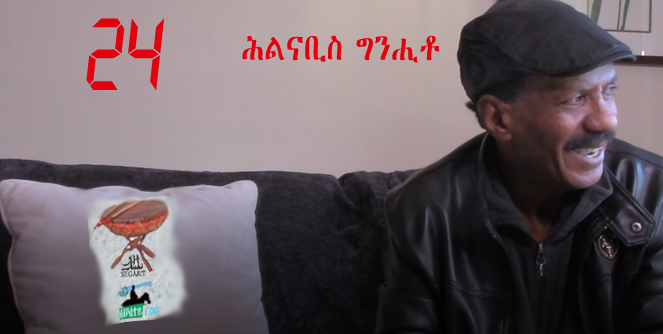Singers and Poets
About ten years ago there was a popular singer named Tarreqe. He had a unique voice. Until his slow disappearance, he used to remind me of Mohammed Wardi the Sudanese singer.
Last time I watched Isaias’ marathon interview–I had to because it’s my raw material. After the end of the interview, Helen Meles screeched, neberlna, neber [Isaias, continue living for us]. What a song! Again, I remembered Mohammed Wardi.
When I was a child, every time the Ethiopian army (Tor Serawot) returned to town after a village-torching campaign, they chanted poorly composed song of drunkards: Jegnatchin temelesse, Dessie, Haile Selassie. The never-ending looped song was one of songs with which Ethiopians received the King as he returned from exile piggybacked on the British forces–under the command of General Wingate and others. Back then, Wardi was not yet popular.
Nowadays I see singers, particularly who gained notoriety by jumping fences, who has angered many Eritreans. Even a Tigrayan woman was angry she had to frankly tell the few Eritreans to keep away from interfering in Tigrayan affairs; “we don’t want you, stay in your own country” she snapped. That brought back a vivid memory of Wardi. So, why do I remember Werdi?
Well, I have made similar appeals, repeatedly, yet, I must keep repeating the same message. Now I will tell you why I remember Wardi.
When Jaafer AlNimeiri came to power, the popular singer Werdi composed a song, ‘Haaresna we’faarisna’ [our protector and our hero]. School children, amateurs and the marching bands played the song that had almost become as popular as the Sudanese national anthem.
In 1971, Sudanese communist party officers under the leadership of colonel Hashim Al Atta overthrew President Jaffer Nimeiri and they put him in custody. Immediately Wardi switched allegiance and changed the lyrics, Laa Haaresns we’laa farisna [neither our protector nor our hero].
Babikir AlNour, the leader of the coup was in London and boarded a private plane to return to Khartoum to assume power. However, as his plane was flying over the Libyan airspace, Gadhafi, a loyal friend of Nimeiry, had his fighter planes intercept Babikir AlNour’s plane and forced it to land. The Libyans put Babikir in custody.
Meanwhile in Khartoum, upon hearing the news that Babikir was detained in Libya, Nimeiri loyalists were encouraged to act and aborted the short-lived coup and arrested Hashim Al Atta and his colleagues. They freed Nimeiri and reinstalled him as president. The coup ended. Upon securing his power, Numeiri immediately arrested the engineers of the coup and Alkilled them all—including Babikr AlNur whom Libya delivered to AlNumeiri. Wardi was jailed for treason.
600 years ago, there lived a poet who is still one of the greatest poets who ever lived. His poetry is so famous it is taught like Shakespeare’s in Arab schools. But AlMutenebi was a racist to boot and lived on gifts provided by the Sultans and princes he praised. AlMutenebi traveled all over the land and lingered the palace lounges of the powerful. He would compose a poem of a few praise stanzas and he would be rewarded with gold and silver coin sacks. In a time where there were no mass media, or social media, poetry was an effective propaganda tool.
The Mamlouki Dynasty
The Mamluki were ex-slaves who gradually assumed power and established a dynasty—Mamluk means a slave. Their center of power was in Egypt, and they ruled from Cairo. One of the Memlouki kings was an Abyssinian ex-slave named Kaafoor “the perfume musk” AlAkhshidi. But AlMutenebi describes him as an ugly, crass person with deformed toes.
AlMutenebi traveled to Cairo and was welcomed in Kafoor’s palace. But after so much praise, he discovered the king was stingy, not as generous as he expected him. He wanted to leave but Kafoor prevented him from leaving fearing his poetic insults once he reaches leaves Kafoor’s dominion. But finally, AlMutenebi managed to leave, and as Kafoor feared, once he was in Syria, Al Mutenebi recited a scathing poem against Kafoor. In the poem AlMutenebi said, La teshteri ‘lAbda w’illa ‘l Assa mAahu [But a slave together with a stick…]. Meaning, slaves must be beaten to be straightened up!
AlMutenebi was a racist to boot and made many racist pronouncements. Living in the Gulf States, I was surprised to discover such poems were taught in schools. I am not sure if they still teach that.
Singers and Poets, Abbe as an example
They belong to one of two types—puppets in the hands of rulers, and others who despise injustice, tyranny, and inspire people to forcefully reclaim their freedom. Now you can tell between the puppet-poets and singers, and the conscious poets and singers. Of the latter we have so many, including Abbe Abdalla, Hussein Mohammed Ali, Idris Mohammed Ali, Osman Abdulrahim. And we have a few who advance destructive propaganda.
Abbe Abdalla died a year or so ago, and I remember him for his romantic songs before he went full blast to nationalist songs after joining the armed struggle… One of his everlasting lyrics was played by the brilliant Abdelaziz Mranet [linked here].
Lale wellele, wellale,
lale yeoulale, yeoulale male embel selam Halefkina
re’ekuki mn Ad sidi etfegri,
se’Eeko w’Aereko ebki,
saAmkuwo aser la’ egrki….
Abbe loved a girl, but in a conservative town, he had to wait to get a glimpse of her. When he saw her getting out of Suffi Mirghaniya compound, he run after her but couldn’t reach her. He kissed her footprints. That’s the gist of his mesmerizing song now immortalized by Mranet.
I am wondering what do people who cannot sing and compose poetry do when they have the itch to praise tyrants? They attack those who do, and they can’t do a good job on it either. But they can only repeat street rumormongering and defamation.
I am not mad at the Agazian anymore, but I miss them since they disappeared—unlike the four or five years when they thought their racist campaign was bearing fruit. But they were colorful, until they disappeared. Now adays we have copycats, those who invite the invasion of Eritrea. And there are two types of them: those who openly called an invasion of Eritrea by foreign forces, and those who have allied themselves (including the Eritrean regime) with the Amhara chauvinists.
I can only tell the former that they are calling for a risky solution and it will be more costly. If not for the short term, it will leave a long-term unsolvable problem. As for the trailers, in Eritrea we identify them by the Italian word, rimorchio, they have no independence, autonomy, or decision—they are pulled by trucks. Do worry about them it is in their nature to be wishy-washy. Like a pendulum in grandfather clock, they sway left and right continuously, and they have no qualms changing their principles or positions—unless they are broken. It’s like what Wardi did in 1971.
The PFDJ and its crowd are allied to the Tor Serawit I told you about and they are chanting: Lij Abiy Geseggese, Dessie Abiy Selassie.
Now, some idiots want me to choose between the Invasion of Eritrea by TPLF or by Tor Serawit. I don’t know what difference they see between the two invasions!
Eritrea-Centered
My thought is centered around the wellbeing of Eritrea, within it, nothing outside its borders. Ethiopian issues are not Eritrean issues. That’s why Eritreans should keep their hands off cross border adventures. The pendulums can more whichever direction they wish; I will remain in my position even if I am the last person standing. But wait a minute, “standing alone” is a figure of speech. Those who prefer to stick to Eritrean issues and reject interference in Sudan, or Ethiopia, or Somalia or Yemen, or any other place, are so many.
Conscious Eritreans believe there’s enough work to do at home and jumping into foreign issues is utter recklessness. I do not have a problem if the country has a constitution, an elected body of legislators who appoint the legal and executive bodies, who can then decide on national issues. But going to war, repeatedly, on the whims of a dictator, is madness—and weakness.
This I believe is an Eritrea-centered vision and it will prevail—don’t be swayed or blackmailed to choose between being shot by a bomb dropped by drone or an airplane—both tear you apart. Eritrea will prevail, just stay steadfast and principled. Be primarily concerned about the wellbeing of your country and people—let the shouters do what they do best—they will switch sides soon, that is the best they do.
- Abiy Ahmed
- agitating people
- celebrating patriotic singers and poets
- eritrea
- Eritrean interferes in Ethiopian civil war
- Ethiopia
- Ethiopian civil war is dividing Eritreans
- exposing chauvinists and racists
- focus on saving civilian lives
- freedom and justice
- Isaias Afwerki
- no development without arts
- peace
- PFDJ
- propaganda wars
- singers and poetsundemocratic nations
- Sudanese Mohammed Wardi and propaganda
- Tigray
- TPLF
- traditional romantic singer Abbe Abdalla



Awate Forum